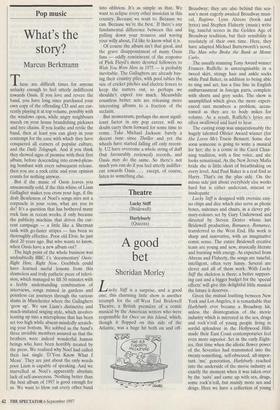Pop music
What's the story?
Marcus Berkmann
These are difficult times for anyone unlucky enough to feel utterly indifferent towards Oasis. If you love and revere the band, you have long since purchased your own copy of the offending CD and are cur- rently playing it at top volume, possibly with the windows open, while angry neighbours march on your house brandishing pickaxes and tyre chains. If you loathe and revile the band, then at least you can glory in your contempt for the ease with which they have conquered all corners of popular culture, and the Daily Telegraph. And if you think they showed signs of promise with their first album, before descending into crowd-pleas- ing bombast with every subsequent release, then you are a rock critic and your opinion counts for nothing anyway.
But if the music of Oasis leaves you unseasonally cold, if the thin whine of Liam Gallagher makes you cross your legs, if the drab Beatleness of Noel's songs stirs not a corpuscle in your veins, what are you to do? It's a question that has bothered many rock fans in recent weeks, if only because the publicity machine that drives the cur- rent campaign — a little like a Sherman tank with go-faster stripes — has been so thoroughly effective. Poor old Elvis: he just died 20 years ago. But who wants to know, when Oasis have a new album out?
The high point of the whole business was undoubtedly BBC l's 'documentary' Oasis: Right Here, Right Now. Goebbels could have learned useful lessons from this shameless and truly pathetic piece of televi- sion, which managed to fill 50 minutes with a feebly undemanding combination of interviews, songs mimed in gardens and pointless car journeys through the various slums in Manchester where the Gallaghers `grew up'. We saw Liam's distinctive and much-imitated singing style, which involves leaning up into a microphone that has been set too high while absent-mindedly scratch- ing your bottom. We sobbed as the band's three invisible members assured us that the brothers were indeed wonderful human beings who have been horribly treated by the press. We realised why Noel had called their last single `D'You Know What I Mean'. They are just about the only words poor Liam is capable of speaking. And we marvelled at Noel's apparently absolute lack of self-awareness. 'Nothing better than the best album of 1997 is good enough for us. We want to blow out every other band into oblivion. It's as simple as that. We want to eclipse every other musician in this country. Because we want to. Because we can. Because we're the best.' If there's any fundamental difference between this and pulling down your trousers and waving your willy about, I'd like to know what it is.
Of course the album isn't that good, and the grave disappointment of many Oasis fans — oddly reminiscent of the response of Pink Floyd's more devoted followers to Wish You Were Here in 1975 — is probably inevitable. The Gallaghers are already buy- ing their country piles, with pool tables the size of cricket pitches and electric fences to keep the nutters out, so perhaps we shouldn't expect too much. Meanwhile countless better acts are releasing more interesting albums to a fraction of the acclaim.
But momentum, perhaps the most signif- icant factor in any pop career, will no doubt carry them forward for some time to come. Take Michael Jackson: barely a decent tune since Thriller and yet the wheels have started falling off only recent- ly. U2 have overcome a whole string of duff (but favourably reviewed) records, and Oasis may do the same. So there's not much you can do if you feel utterly indiffer- ent towards Oasis . . . except, of course, listen to something else.


























































 Previous page
Previous page